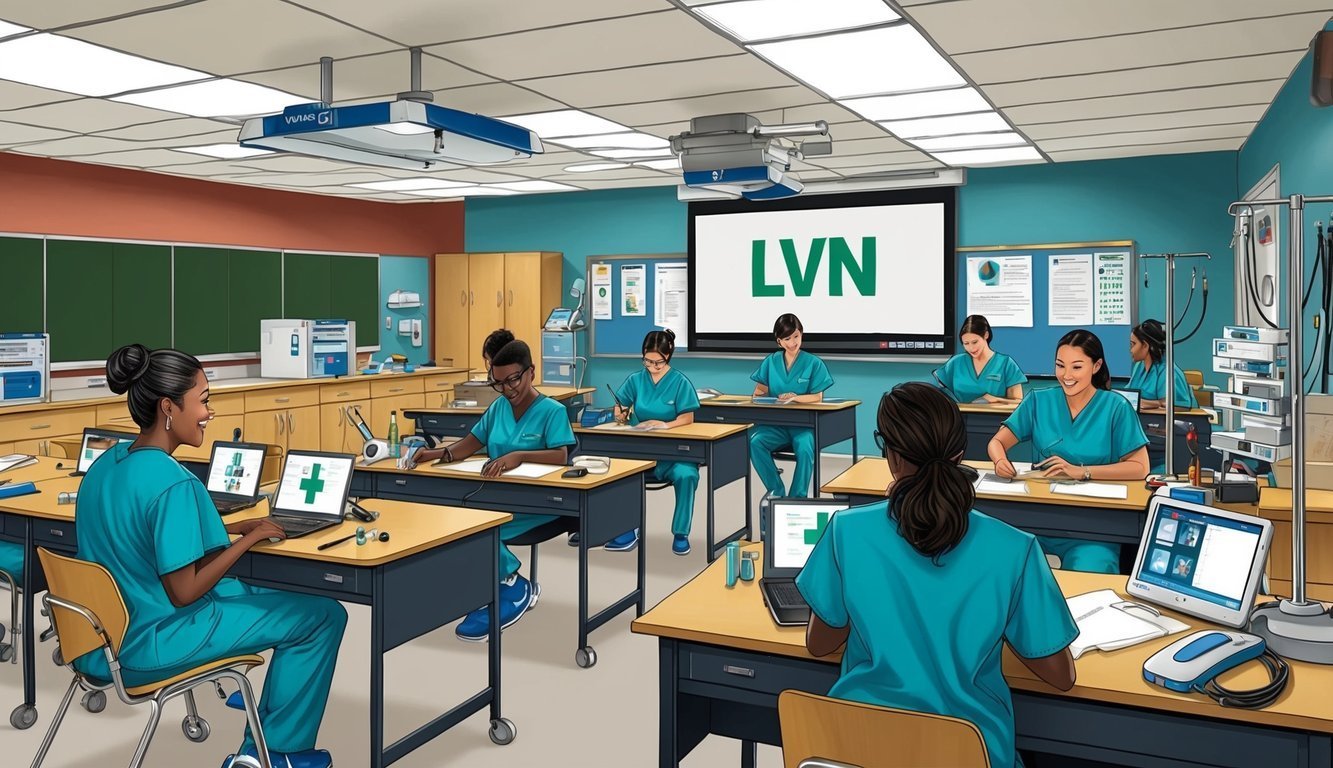If you’re considering a career as a Licensed Vocational Nurse (LVN) in Sacramento, you’ll find a variety of programs that can get you started.
Sacramento offers several options for vocational nursing programs that prepare you for this rewarding field.
These programs provide essential training and hands-on experience, often allowing you to graduate in as little as 12 months.
The path to becoming an LVN involves understanding both the educational requirements and the practical components of the training.
You’ll engage in clinical experiences, working directly with patients, which will help you build the skills needed for your future career.
Choosing the right program can open doors to various pathways in nursing, including further education and specialized roles.
Exploring your options in Sacramento can lead to a fulfilling career in healthcare.
With the increasing demand for vocational nurses, now is a great time to consider your future in this vital profession.
Key Takeaways
- LVN programs in Sacramento often complete in about 12 months.
- Hands-on training in clinical settings is vital for developing nursing skills.
- Graduates have pathways to advanced nursing roles and further education.
Understanding LVN Programs

LVN programs prepare you to become a Licensed Vocational Nurse by providing essential nursing education and practical skills.
You will learn the fundamentals of nursing and gain hands-on experience, which are critical for your career in healthcare.
Exploring Vocational Nursing
Vocational nursing focuses on basic patient care, including monitoring vital signs and assisting with daily living activities.
As an LVN, you will work under the supervision of registered nurses and doctors.
Your training will cover important areas such as Nursing Fundamentals, Physiology, and patient communication skills.
The role of a licensed vocational nurse is crucial, as you will be involved in:
- Basic patient assessments
- Administering medications
- Providing wound care
These skills are crucial for ensuring patient comfort and safety in various healthcare settings.
LVN Program Structure
A typical LVN program combines classroom instruction with clinical practice.
You will study subjects like biology, pharmacology, and nursing ethics.
The curriculum is designed to ensure you acquire both theoretical knowledge and practical skills.
The program usually includes:
| Course Type | Description |
|---|---|
| Classroom | Lectures on nursing theories and practices |
| Laboratory | Hands-on practice with medical equipment |
| Clinical Rotations | Real-world experience in healthcare facilities |
This structure will help you apply what you learn in a real-world setting, enhancing your confidence as a future nurse.
Program Prerequisites
Before enrolling in an LVN program, you must meet specific prerequisites.
Most programs require you to have a high school diploma or GED.
Additionally, you often need to complete certain courses with a grade of “C” or better, such as:
- Anatomy
- Physiology
- Nursing Fundamentals
Some programs also require a minimum GPA, typically around 2.5.
Having these prerequisites ensures that you are well-prepared to succeed in your vocational nursing education.
For program details and application requirements, check out Sacramento City College’s program.
Enrollment and Admission Requirements
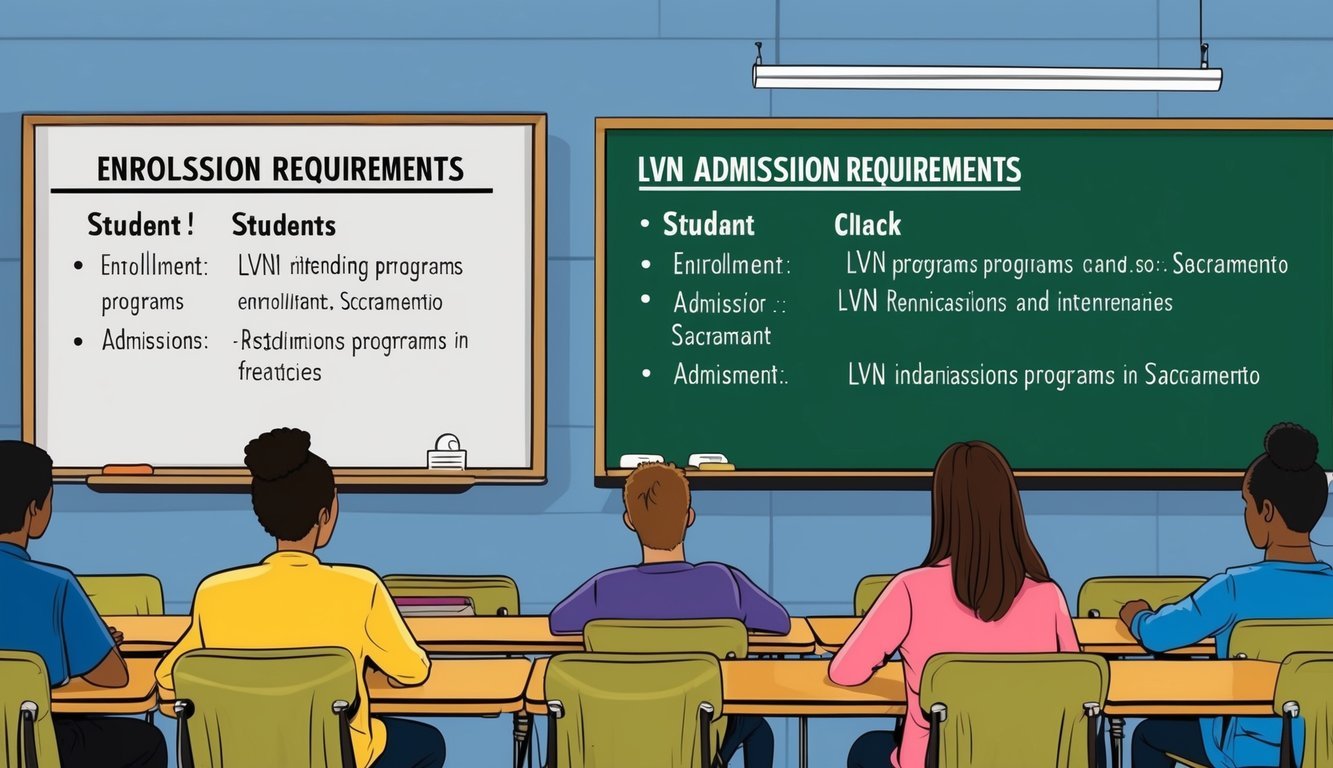
Navigating the enrollment and admission process for LVN programs in Sacramento involves several important steps.
This section outlines the key requirements and procedures to help you understand what is needed for a successful application.
Information Sessions
Before applying, you should attend an information session if offered by your chosen school.
These sessions provide valuable insights into program details, curriculum, and faculty.
You will also learn about the application process and important deadlines.
Typically, these sessions are held monthly and may be available both in-person and online.
Be sure to check the schedule and register in advance.
Ask questions to clarify any aspects of the program that concern you.
Nursing Applications
The nursing application process typically involves submitting various documents.
Most programs require:
- A completed application form
- Proof of high school graduation or equivalent
- Official transcripts from any colleges attended
- Verification of prerequisite courses, often needed with a grade of “C” or better
You may also need to pass a background check and provide a personal statement.
Additionally, be prepared to meet the application deadlines set by your program.
This is crucial for timely consideration.
Admission Criteria
Admission criteria vary among programs but generally include:
- Minimum GPA requirements (often a 3.0 in science courses and 2.5 in non-science courses)
- Completion of prerequisite courses before applying
- Evidence of health requirements, which may include immunizations, such as COVID vaccines
Some programs have specific policies for religious exemptions regarding vaccinations.
It’s important to understand the expectations of your chosen clinical facility, as these requirements directly impact your eligibility for placement.
By familiarizing yourself with these requirements, you’ll be better prepared to navigate the application process effectively.
Clinical Experience and Hands-On Training
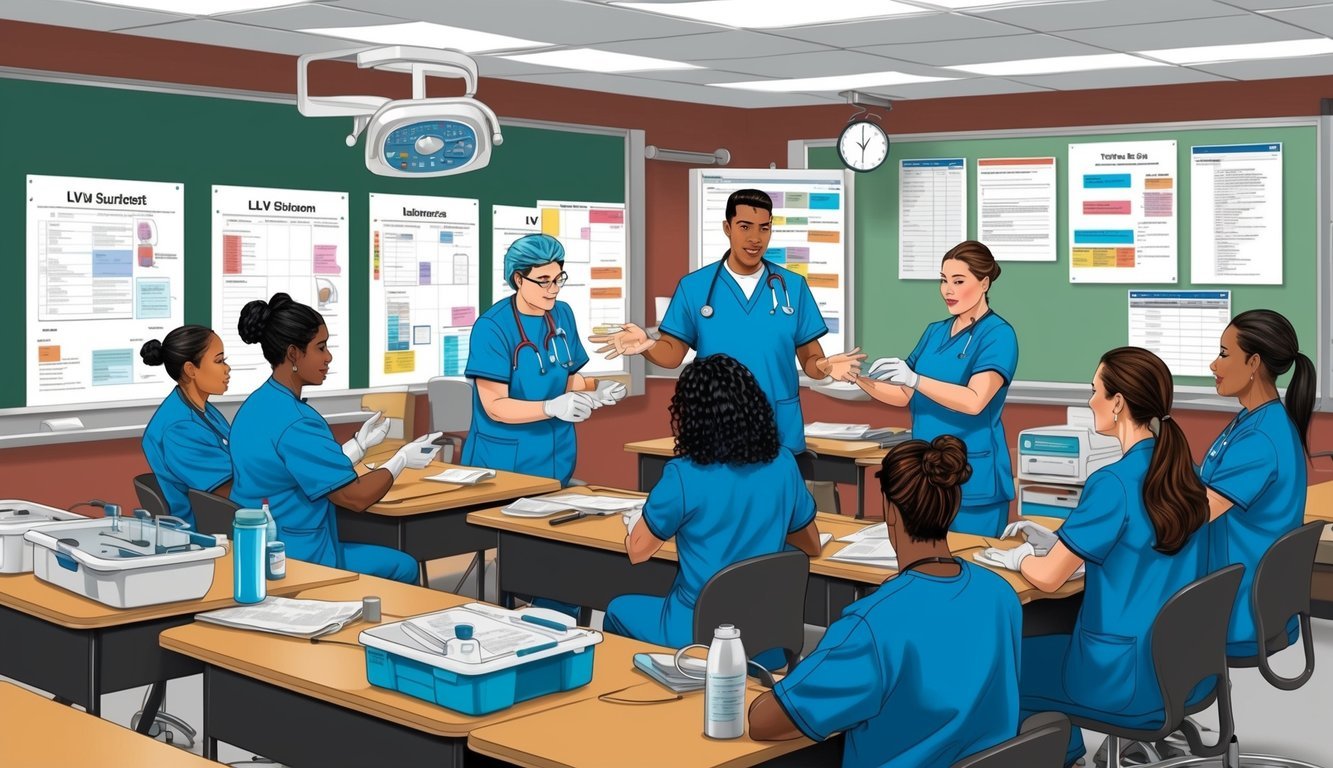
In LVN programs, clinical experience and hands-on training are critical for your education.
These components allow you to apply what you’ve learned in real-world healthcare settings, ensuring you build the skills needed for your future career.
Healthcare Facilities Partnership
Many LVN programs have partnerships with local healthcare facilities.
This connection lets you gain experience in settings like hospitals, nursing homes, and outpatient clinics.
These placements provide you with opportunities to observe and participate in patient care under the supervision of experienced healthcare professionals.
You will work with diverse patient populations and learn to address various medical needs.
Networking with professionals during your clinical rotations can also lead to job opportunities after graduation.
Skill Development
Skill development is a key focus of hands-on training in LVN programs.
You will practice essential tasks such as taking vital signs, administering medications, and providing basic patient care.
Training often includes simulations and lab work to build your confidence before entering clinical settings.
Many programs use advanced technology to enhance learning, such as virtual simulations for procedural skills.
Regular feedback from instructors helps you improve your techniques.
This practical training ensures that you are well-prepared to provide quality care once you enter the workforce.
Post-Graduation Pathways
After completing an LVN program in Sacramento, you have several pathways to consider.
These options include preparing for the NCLEX-PN exam and exploring various job opportunities in the healthcare field.
NCLEX-PN Exam Preparation
To practice as a Licensed Vocational Nurse, you must pass the NCLEX-PN exam.
This licensure test assesses your knowledge and skills in nursing.
It is important to start your preparation as soon as you finish your LVN program.
Here are a few steps you can take:
- Review Course Material: Revisit your class notes and textbooks.
- Practice Questions: Use NCLEX-PN practice tests to familiarize yourself with the format.
- Study Groups: Join or form a study group with fellow graduates to discuss key topics.
- Prep Courses: Consider enrolling in NCLEX-PN preparation courses or workshops.
For more resources on preparation, explore NCLEX-PN study tips.
Job Outlook and Opportunities
The job outlook for LVNs remains positive.
Employment in this field is expected to grow, giving you many options after graduation.
In California, LVNs can work in settings such as:
- Hospitals: Providing patient care and assisting registered nurses.
- Nursing Homes: Offering care to elderly patients.
- Home Health Care: Visiting patients in their homes to provide medical support.
If you wish to advance your career, consider enrolling in a Registered Nursing Program.
This can lead to even greater opportunities and higher salary potential.
The LVN-to-RN program is a common choice for further education.
For specific job listings and market trends, visit Bureau of Labor Statistics.
Accreditation and Educational Institutions
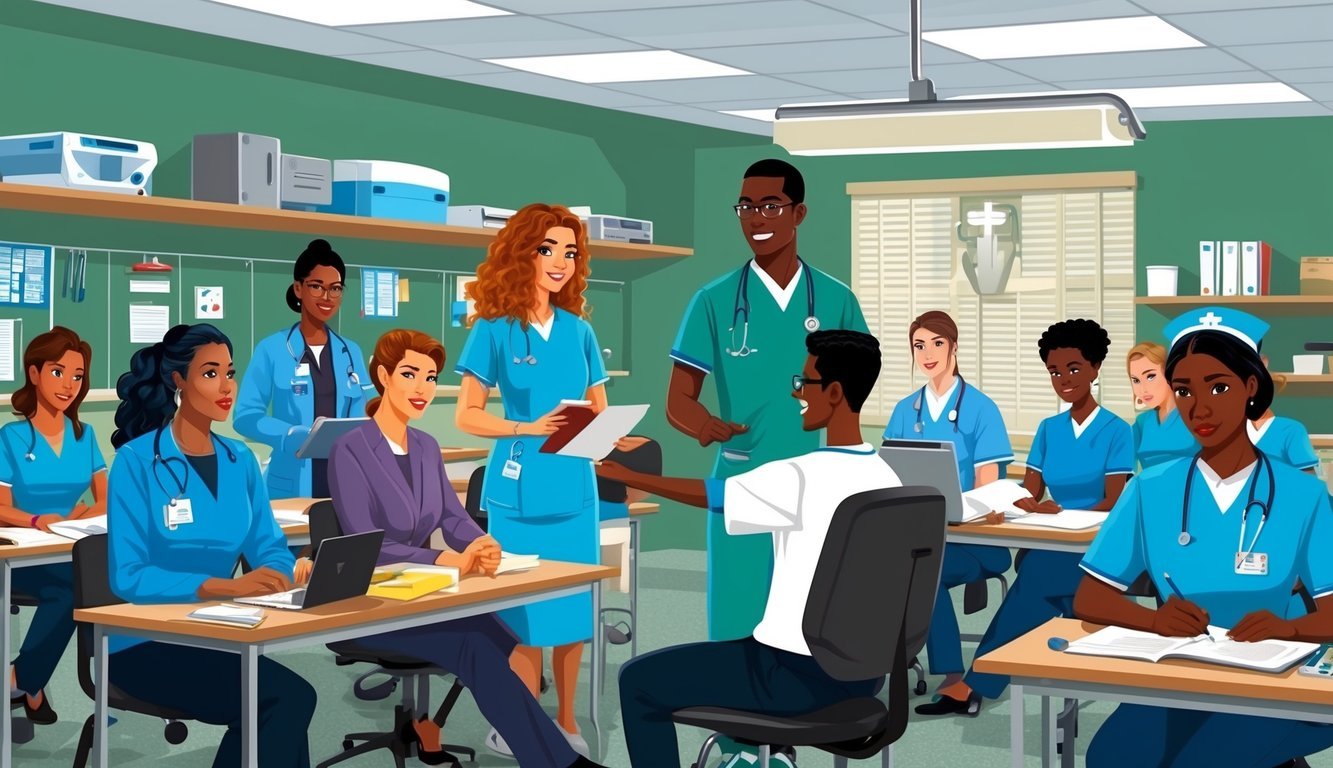
Accreditation and the quality of educational institutions play a crucial role in the success of your Licensed Vocational Nurse (LVN) career.
Understanding the available programs in Sacramento will help you make an informed choice for your education.
Sacramento City College
Sacramento City College (SCC) offers a solid LVN program that prepares you for the NCLEX-PN exam.
The program combines classroom instruction with clinical experience, providing hands-on learning in diverse healthcare settings.
SCC is accredited by the Accrediting Commission for Education in Nursing (ACEN), ensuring the quality of your education.
Their program includes topics like pharmacology, patient care, and rehabilitation.
You can find more details on their official website.
Los Rios Community College District
The Los Rios Community College District encompasses several colleges, including Sacramento City College, American River College, and Cosumnes River College.
Each institution offers vocational nursing programs that meet state and national accreditation standards.
These programs focus on critical nursing skills and ethical considerations in patient care.
They are approved by the California Board of Vocational Nursing and Psychiatric Technicians, ensuring that you receive quality education.
You can explore their offerings through the Los Rios website.
Private Colleges Overview
Private colleges like Unitek College and Carrington College also provide strong LVN programs in Sacramento.
Unitek College features a comprehensive vocational nursing curriculum that includes clinical practice and theoretical instruction.
This program is designed to equip you with essential nursing skills.
Carrington College offers another viable option.
Their LVN program emphasizes hands-on training and interprofessional collaboration, ensuring you are job-ready upon completion.
Both colleges are accredited institutions, which is vital for your education quality.
For more details, check Unitek College and Carrington College.
Frequently Asked Questions
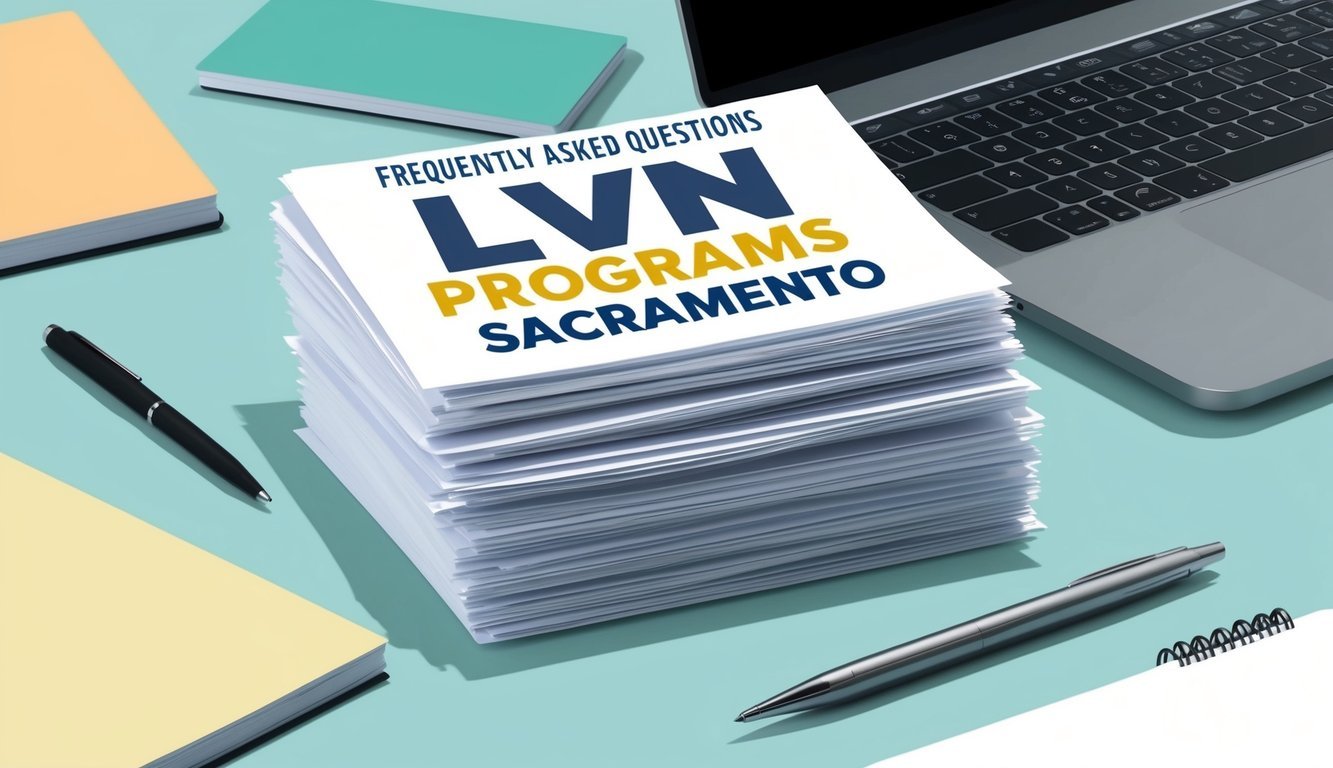
In this section, you will find answers to common questions about LVN programs in Sacramento.
These questions cover program ratings, costs, duration, and potential earnings.
What are the top-rated LVN programs in the Sacramento area?
The top-rated LVN programs in Sacramento include programs from Unitek College and American River College.
Unitek College is known for its strong training and supportive environment.
American River College also offers a well-regarded LVN certificate program with comprehensive coursework.
Are there any free LVN training options available in Sacramento?
Free LVN training options in Sacramento are limited.
Some community organizations may offer scholarships or grants, but most programs require tuition.
You might want to check with local non-profits or community colleges for possible financial assistance programs.
How long is the typical duration of an LVN program in California?
A typical LVN program in California lasts about one year.
Most programs consist of both classroom instruction and clinical practice.
This combination helps you gain the skills needed for the nursing field.
What is the average cost of LVN programs in Sacramento?
The average cost of LVN programs in Sacramento ranges from $10,000 to $30,000.
Tuition varies depending on the institution.
Additional costs may include textbooks, uniforms, and supplies.
How much can an LVN expect to earn in the Sacramento region upon program completion?
Upon completion of an LVN program, you can expect to earn around $50,000 to $60,000 annually in the Sacramento region.
Pay can vary based on experience and the specific healthcare setting you work in.
Do any universities or colleges in Sacramento offer accredited LVN programs?
Yes, several universities and colleges in Sacramento offer accredited LVN programs.
Institutions like Unitek College and American River College have programs that meet state and national accreditation standards.
You can check their official websites for specific details on accreditation and program offerings.

